Graham Reid | | 6 min read
Grace Slick: Come Again? Toucan? (from Manhole)
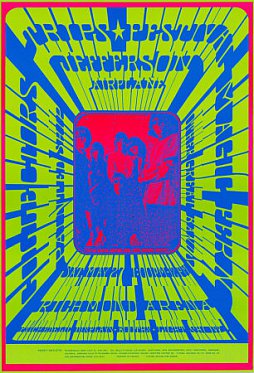
The New York garageband Blues Magoos'
Psychedelic Lollipop of 1966 was one of the first albums to have the
word “psychedelic” in the title, but it wasn't quite the
spaced-out sweet thing the name suggested.
13th Floor Elevators out of Texas the
same year with their debut The Psychedelic Sounds of the 13th Floor
Elevators were more like the real thing: Psychedelic Sounds is
considered a psyched-out classic.
By the following year – 1967 with its
famous Summer of Love – the drugs, Indian music and guitar solos
had really started kicked in. The word “psychedelic” really
started to mean something. Although different things to different people . . .
Moby Grape and Country Joe and the Fish
out of San Francisco delivered debut albums which were sufficiently
pop-rock to keep your attention, but also somewhat mind-bending.
Jefferson Airplane – alongside the Grateful Dead – were banner-wavers for psychedelic rock and a musically powerful unit: singer/guitarist Marty Balin, singer/keyboard player Grace Slick (from The Great! Society who had replaced Signe Anderson after their debut album); rhythm guitarist Paul Kantner; lead guitarist Jorma Kaukonen; bassist Jack Casady and drummer Spencer Dryden.
And all of them, to a greater or lesser extent, wrote.
But by 1969 with the album Volunteers –
just two years on from Somebody to Love and White Rabbit – they had
abandoning the whole Summer of Love vibe for more direct militant
rock (the Dead's Jerry Garcia among others parting company
philosophically).
Two more years on and they were split
internally: Dryden left in 1970, then Balin quit the band he had
founded and critic Lester Bangs was writing of “the fire of the
Kaukonen-Casady combination (one of the great lead/bass juxtapositions
of all time, in the context of the Airplane) and the bambastic [sic]
excesses of the Slick-Kantner axis, who, after all, wrote most of the
songs and have increasingly stamped the group's identity with their
own sensibilities”.
Yet despite diminishing musical returns
the Airplane kept on: the first post-Balin album Bark wasn't up to
much in the lyrics (an increasing failing, Pretty As You Feel boasted
a great menacing tune but teeny-bop sentiments) and in '79 the
Rolling Stone Record Guide wrote it off as “wretched”; and they
split off into side projects.
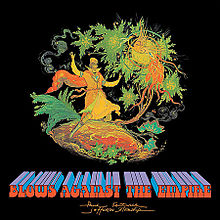 Blows Against the Empire in '70 was a
concept album under Kantner's name (which included many Airplane
members and fellow travelers including Slick, and Jerry Garcia) which
he'd worked up while the Airplane were in-fighting.
Blows Against the Empire in '70 was a
concept album under Kantner's name (which included many Airplane
members and fellow travelers including Slick, and Jerry Garcia) which
he'd worked up while the Airplane were in-fighting.
It was also the
first time the name “Jefferson Starship” appeared (on the cover
beneath Kantner's name) although the post-Airplane band of that name
didn't arrive until four years later – but it was inauspicious
unveiling of the name.
Perhaps it was the acid, perhaps the
mood of the times – but a concept about people fleeing “Uncle
Samuel” and oppression by stealing a spaceship and looking for a
new home isn't the strongest of ideas, and hardly seems a blow
against the evil empire of Amerikkka, more a flight from the
frontline.
There are also some seriously
addled/naive lyrics (a tree which grows babies?) and – aside from
the experimental suite on the second side, the star trek -- the
music is hardly memorable.
Ed Ward writing in Rolling Stone was
merciless: “If Paul Kantner really thinks that the pap he is
serving up here is a blow against the empire, I suggest he takes a
bowl of oatmeal and a spoon and start throwing oatmeal at some of the
buildings he'd like to see topple and see how long it takes. What it
is, is a blow against the sensibilities of anyone who has come to
expect reasonably sophisticated music and lyrics (sophisticated for
rock lyrics, anyway) from Paul Kantner and the Jefferson Airplane.”
It did however become the first rock
album to be nominated for the Hugo (sci-fi writing) awards.
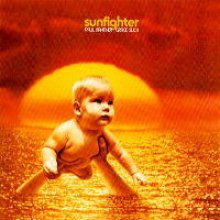 The following year Kantner and Slick – who by this time were a couple with a baby, China -- came out with Sunfighter (that's China on the cover) which divided Airplane loyalists: Some dismissed it as Kantner/Slick indulgence about parenting and
some hippy-dippy concerns (although Diana was inspired by Diana
Oughton, one of the revolutionary Weathermen killed when a homemade
bomb she and others were building blew up their New York apartment).
The following year Kantner and Slick – who by this time were a couple with a baby, China -- came out with Sunfighter (that's China on the cover) which divided Airplane loyalists: Some dismissed it as Kantner/Slick indulgence about parenting and
some hippy-dippy concerns (although Diana was inspired by Diana
Oughton, one of the revolutionary Weathermen killed when a homemade
bomb she and others were building blew up their New York apartment).
Others heard beautiful songs on an album about personal and social renewal. ("An excellent set, able to withstand comparisons with any of early seminal Airplane work," said the '78 NME Encyclopedia of Rock.)
More interesting however was Baron Von
Tollbooth and the Chrome Nun from '73 by Kantner, Slick and
bassist/singer/keyboard player Dave Freiberg (from Quicksilver Messenger Service) who had joined the Airplane the previous year. The album also had the Dead's Garcia on guitar,
mandolin and banjo, and guitarist Craig Chaquico.
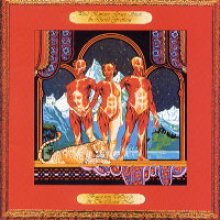 Tollbooth/Chrome Nun (the title referred to Crosby's nicknames for Kantner and Slick) was widely
considered the best album by Airplane's crew since Crown of Creation
in '68.
Tollbooth/Chrome Nun (the title referred to Crosby's nicknames for Kantner and Slick) was widely
considered the best album by Airplane's crew since Crown of Creation
in '68.
The shapeless solos had been trimmed and no “concept” weighed it down; there were dreamy, trippy songs from Kantner (Mind has
Left Your Body) and drama from Slick's powerful voice (the tough
Across the Board, Fat with the Pointer Sisters on backing vocals); rousing political and social sentiments (Flowers of the Night); Garcia is terrific everywhere (especially on the country-flavoured
Walkin') and it ends with the gorgeous, mysterious Sketches of China
which could have been about the country or Kantner/Slick's daughter. There is also Slick's raunchy Across the Board (“seven
inches of pleasure, seven inches going home”).
Slick's first solo album Manhole ('74)
found her with various Airplane members, David Crosby and the London
Symphony Orchestra.
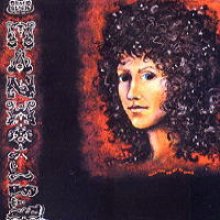 Manhole -- the title a typically smutty Slick snicker -- is odd but interesting.
Manhole -- the title a typically smutty Slick snicker -- is odd but interesting.
It opens with a gently evocative Jay with wordless lyrics then there is the increasingly soaring, orchestrated, Spanish-inspired and quite exceptional 15 minute title track, the soundtrack for a film never made.
Toucan, Come Again
is beautiful ballad (music by Freiberg, the mercurial guitar by Chaquico) and the closer is Epic #38
which is an orchestrated suite and comes with heart-stirring
bagpipes.
And Better Lying Down was a
straight-ahead blues with Pete Sears on barrelhouse piano.
It is one of the most overlooked Airplane-offshoot albums and Slick, unfortunately, wouldn't make another solo album under her own name until 1980.
And then, against the odds as there had
been so many side projects – including Hot Tuna which was an
on-going vehicle for Casady, Kaukonen and others – the Airplane
resolved some differences and reformed in '74 . . . as Jefferson Starship.
Things began well enough with the debut
album Dragon Fly then the chart-damaging Red Octopus – but
thereafter the Jefferson Starship name was tainted by
increasingly bland albums which eventually lead to Bernie
Taupin-penned AOR stadium rock of We Built This City in '85, which,
ironically was a line-up with no original Airplane/Starship members
other than Slick (who had joined after the first Airplane album
anyway).
It was a strange flight the Airplane/Starship had taken.
From Balin being bashed by Hells Angels at Altamont to commercial corporate rock; from stoned psychedelic then rabble-rousing revolutionary rock to spaced-out sci-fi . . . and finally stadium pabulum.
How the mighty had fallen.
Want to read and hear more psychedelic music of the period? Then your trip starts here. The '93 Jefferson Airplane box set is essayed here.

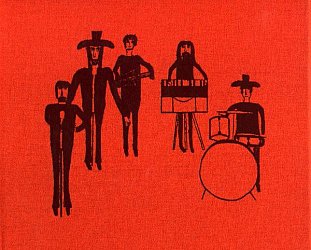
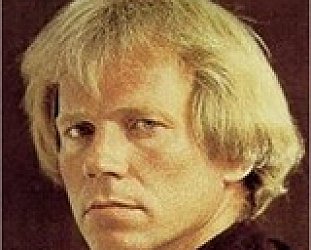
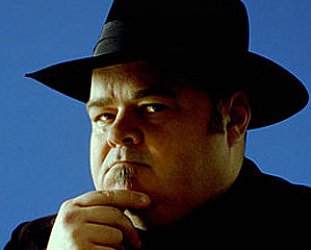

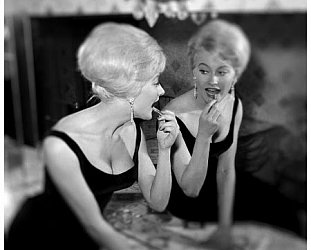
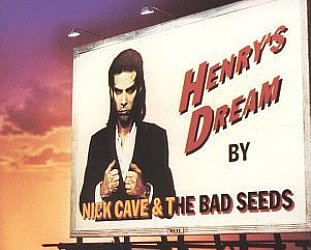
post a comment